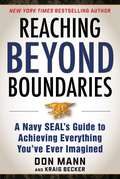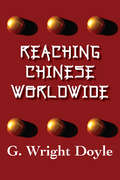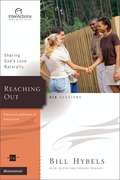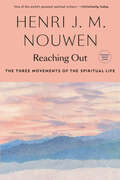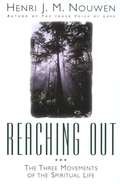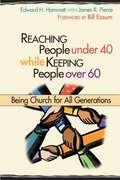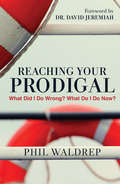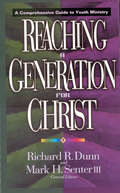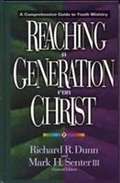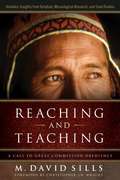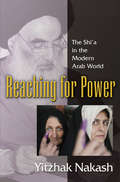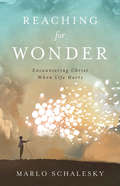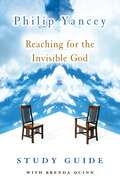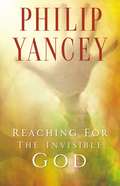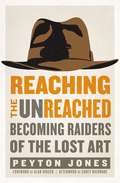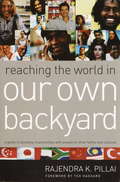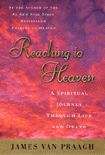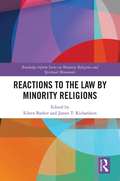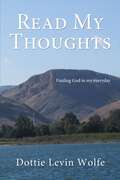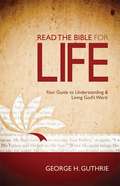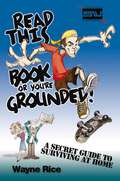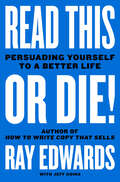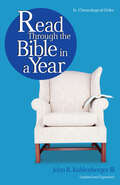- Table View
- List View
Reaching Beyond Boundaries: A Navy SEAL's Guide to Achieving Everything You've Ever Imagined
by Don Mann Kraig BeckerFor the last decade, decorated Navy SEAL, accomplished athlete, and bestselling author Don Mann has been traveling across the country giving motivational talks and in the process inspiring hundreds with the secrets behind his awe-inspiring achievements. In Reaching beyond Boundaries, Mann brings his much sought-after wisdom to the page. As an elite Navy SEAL, Mann performed seemingly impossible tasks on a regular basis. Here he details the lessons he learned from his training and shows how the rest of us can apply those teachings to our daily lives in terms of learning to push beyond our internal boundaries and achieve the goals we’ve set for ourselves, both professionally and personally. Reaching Beyond Boundaries teaches how to set and conquer both micro- and macro-goals through removing excuses, having the right mindset, and learning from successes and failures. Making your dreams a reality is possible. With Reaching Beyond Boundaries you can begin to realize your fullest potential today.
Reaching Chinese Worldwide
by Wright DoyleReaching Chinese Worldwide introduces the many ways in which Christians may communicate the truth and love of God in Christ to Chinese around the world. Drawing upon four decades of reading and experience, the author first lays a biblical foundation for cross-cultural witness, then briefly explores the various facets of ministry among Chinese: Preparation, Presence, Proclamation, Points of Contact, "Perfection" of Believers, Participation in the Body of Christ, Performance of Good Works, and Partnering with God.This nearly comprehensive survey contains both fundamental principles and practical suggestions useful for all those wanting to make a Christian impact on China.
Reaching Out
by Bill Hybels Kevin HarneyYou probably don’t think of yourself as an evangelist. Most Christians would rather leave evangelism to a select few with "special talent" for outreach. But when Christ gave the command to spread the Gospel, He gave it to us all. Because He knew we'd each have something unique to offer as His witnesses to the world. In Reaching Out, Bill Hybels helps you develop your own evangelism style—one that fits your personality like a glove. You'll discover the meaning and importance of sharing your faith and learn the motivation and mind-set behind evangelism. You'll also get the solid guidance and seasoned tips you need to put it all into motion successfully. As you walk through this proven, highly effective approach, you'll find your hesitations melting into an enthusiasm for winning lost men and women to Christ. Interactions—a powerful and challenging tool for building deep relationships between you and your group members, and you and God. Interactions is far more than another group Bible study. It's a cutting-edge series designed to help small group participants develop into fully devoted followers of Christ.
Reaching Out
by Henri J. NouwenWith clarity and depth characteristic of the classics, this spiritual bestseller from the author of The Return of the Prodigal Son lays out a perceptive and insightful plan for the spiritual life and achieving the ultimate goal of that life—union with God.&“One of the world&’s greatest spiritual writers.&”—Christianity TodayHenri Nouwen views our spiritual &“ascent&” as evolving in three movements: The first, from loneliness to solitude, focuses on the spiritual life as it relates to the experience of our own selves. The second, from hostility to hospitality, explores our spiritual life as a life for others. The final movement, from illusion to prayer, offers penetrating thoughts on the most mysterious relationship of all: our relationship with God. Throughout, Nouwen emphasizes that the more we understand (and not simply deny) our inner struggles, the more we will be able to embrace a prayerful and genuine life that is also open to others&’ needs. Reaching Out is a rich book to be read, reread, pondered, and shared. It &“does not offer answers or solutions,&” Nouwen cautions, &“but is written in the conviction that the quest for an authentic Christian spirituality is worth the effort and the pain, since in the midst of this quest we can find signs offering hope, courage, and confidence.&”
Reaching Out (The Three Movements of the Spiritual Life)
by Henri J. M. NouwenWith clarity and deep spiritual insight, this religious bestseller offers today's Christian a perceptive, systematic plan for living the spiritual life achieving union with God.
Reaching People under 40 while Keeping People over 60: Being Church for All Generations
by Edward H. Hammett James R. PierceMany church leaders are asking how to keep people over sixty years of age, who often hold church culture values, while at the same time reach people under forty, who often hold postmodern values. Does satisfying the needs of one group necessarily create a barrier to working with the other? Reaching People under 40 while Keeping People over 60 looks at the church as it seeks to function in a postmodern world, a global change that encompasses more than generational differences.
Reaching Your Prodigal: What Did I Do Wrong? What Do I Do Now?
by Phil WaldrepWhen someone you care about makes poor choices in their lifestyles, relationships, or moral decision making, there is a way to love them back to the wholesome life that will bless them beyond imagination.
Reaching a Generation for Christ: A Comprehensive Guide to Youth Ministry
by Ed Robinson David Roth Paul Borthwick Quentin Schultze Richard Dunn David Olshine William Stewart Dewey Bertolini Dan Webster Dave Rahn Bo Boshers Helen Musick Wesley Black Pamela Campbell Greg Lafferty Mark DeVries John Fischer David Hart Christine Cook Marta Elena Alvarado Gwyn Belden Baker Scott Benson Ridge Burns Mark Cannister Christie Stonecipher Cistola Chapman R. Clark Kevin Conklin Teresa Dunn Diane Elliot Donald Ferris Paul Fleischmann David Garda Ken Garland Stephen Greggo Ronald Habermas Saundra Hensel David Hunsicker Jacob Kwon Tae Joo Russ Knight Tony Ladd Mark Lamport Kevin Lawson Larry Lindquist Sarah Katherine McDavitt Wayne Mitchell Mark Moring Chuck Neder G Keith Olson Leslie Parrott III Steve Patty Ron Powell Chuck Rosemeyer Barry St Clair Mark Senter III Jana Sundene David Veerman Timothy Voss David Warnick Lavon Welty Daniel WeyerhaeuserThings have changed. The Truth has not. The 1950's are gone forever. The days of the Sunday school attendance award and the much-loved Sunday school picnic have faded into oblivion. Yet some youth ministries still operate as if today's kids are living in a vacuum, unaffected by the changing morals of today's society. How can we reach these kids with the truth of the gospel? More than fifty of America's youth experts give advice and encouragement to those who long to see this generation know the love of Christ. They help readers think through their philosophies of youth ministry, break down barriers that impede progress, and maximize their own gifts and the gifts of those who work with them. They answer tough questions such as: How can leaders build a relational youth ministry? How can we find and support volunteers? What are the issues women face in youth ministry? How do we minister in ethnic communities? How should we respond to popular culture? How can we help hurting adolescents? You can have a vibrant youth ministry even in these uncertain times. You can reach this generation for Christ.
Reaching a Generation for Christ: A Comprehensive Guide to Youth Ministry
by Ed Robinson David Roth Paul Borthwick Quentin Schultze Richard Dunn David Olshine William Stewart Dewey Bertolini Dan Webster Dave Rahn Bo Boshers Helen Musick Wesley Black Pamela Campbell Greg Lafferty Mark DeVries John Fischer David Hart Christine Cook Marta Elena Alvarado Gwyn Belden Baker Scott Benson Ridge Burns Mark Cannister Christie Stonecipher Cistola Chapman R. Clark Kevin Conklin Teresa Dunn Diane Elliot Donald Ferris Paul Fleischmann David Garda Ken Garland Stephen Greggo Ronald Habermas Saundra Hensel David Hunsicker Jacob Kwon Tae Joo Russ Knight Tony Ladd Mark Lamport Kevin Lawson Larry Lindquist Sarah Katherine McDavitt Wayne Mitchell Mark Moring Chuck Neder G Keith Olson Leslie Parrott III Steve Patty Ron Powell Chuck Rosemeyer Barry St Clair Mark Senter III Jana Sundene David Veerman Timothy Voss David Warnick Lavon Welty Daniel WeyerhaeuserThings have changed. The Truth has not. The 1950's are gone forever. The days of the Sunday school attendance award and the much-loved Sunday school picnic have faded into oblivion. Yet some youth ministries still operate as if today's kids are living in a vacuum, unaffected by the changing morals of today's society. How can we reach these kids with the truth of the gospel? More than fifty of America's youth experts give advice and encouragement to those who long to see this generation know the love of Christ. They help readers think through their philosophies of youth ministry, break down barriers that impede progress, and maximize their own gifts and the gifts of those who work with them. They answer tough questions such as: How can leaders build a relational youth ministry? How can we find and support volunteers? What are the issues women face in youth ministry? How do we minister in ethnic communities? How should we respond to popular culture? How can we help hurting adolescents? You can have a vibrant youth ministry even in these uncertain times. You can reach this generation for Christ.
Reaching a Generation for Christ: A Comprehensive Guide to Youth Ministry
by Richard R. Dunn Mark H. Senter IIIThey help readers think through their philosophies of youth ministry, break down barriers that impede progress, and maximize their own gifts and the gifts of those who work with them. They answer tough questions such as: How can leaders build a relational youth ministry? How can we find and support volunteers? What are the issues women face in youth ministry? How do we minister in ethnic communities? How should we respond to popular culture? How can we help hurting adolescents? You can have a vibrant youth ministry even in these uncertain times. You can reach this generation for Christ.
Reaching and Teaching: A Call to Great Commission Obedience
by M. David SillsMost Christians know and understand that we are to seek to reach the lost around the world. Yet, Christ's command to us is more specific and calls us to a higher standard of involvement with the peoples of the world. He has called the church to make disciples of all people groups and to teach them to observe all He commanded us (Matthew 28:18-20). In recent years mission agencies and missionaries have increasingly shifted away from discipleship and teaching toward an emphasis upon evangelism and church planting-many to the exclusion of any other field activity. While evangelism and church planting are essential components of a biblical missions program, they are not sufficient for the complete task to which we have been called. Reaching and Teaching examines the task Christ gave in the Great Commission and redefines the task of missions from that which is currently prevalent. It surveys missions strategies and methodologies that have increasingly replaced Christ's Great Commission instructions even as they have sought to fulfill it. It is a clarion call to return to the biblical task of reaching and teaching the nations for Christ's sake.
Reaching for Power: The Shi'a in the Modern Arab World
by Yitzhak NakashAs the world focuses on the conflict in Iraq, the most important political players in that country today are not the Sunni insurgents. Instead, they are Iraq's Shi'I majority--part of the Middle East's ninety million Shi'I Muslims who hold the key to the future of the region and the relations between Muslim and Western societies. So contends Yitzhak Nakash, one of the world's foremost experts on Shi'ism. With his characteristic verve and style, Nakash traces the role of the Shi'is in the struggle that is raging today among Muslims for the soul of Islam. He shows that in contrast to the growing militancy among Sunni groups since the 1990s, Shi'is have shifted their focus from confrontation to accommodation with the West. Constituting sixty percent of the population of Iraq, they stand squarely at the center of the U.S government's attempt to remake the Middle East and bring democracy to the region. This groundbreaking book addresses the crucial importance of Shi'is to the U.S. endeavor. Yet it also alerts readers to the strong nationalist sentiments of Shi'is, underscoring the difficult challenge that the United States faces in attempting to impose a new order in the Middle East. The book provides a comprehensive historical perspective on Shi'ism, beginning with the emergence of the movement during the seventh century, continuing through its rise as a political force since the Iranian Islamic Revolution of 1978-79, and leading up to the Iraqi elections of January 2005. Drawing extensively on Arabic sources, this comparative study highlights the reciprocal influences shaping the political development of Shi'is in Iraq, Saudi Arabia, Bahrain, and Lebanon, as well as the impact of the revival of Shi'ism on the larger Arab world. The narrative concludes with an assessment of the risks and possibilities arising from the assertion of Shi'I power in Iraq and from America's attempt to play an increasingly forceful role in the Middle East. A landmark book and a work of remarkable scholarship, Reaching for Power illuminates the Shi'a resurgence amid the shifting geopolitics of the Middle East.
Reaching for Wonder: Encountering Christ When Life Hurts
by Marlo SchaleskySometimes life hurts. Sometimes you’ve struggled, and stumbled, until it even hurts to hope. Perhaps you’ve faced a spiritual crisis of disappointment, doubt, or a feeling of distance from God due to unanswered prayers and painful circumstances. But what does it mean to encounter Christ in those times? What does he say to us when we have nothing left to say? How do we see him when pain has silenced our prayers and blinded our souls? In Reaching for Wonder, Marlo Schalesky explores fifteen of the New Testament’s one-time encounters with Christ to illuminate the surprising character of a God who transforms our pain into wonder. Because sometimes life isn’t at all as we want it to be... Because we lose the wonder in the hardships of life ... Because encountering Christ changes everything... Like those who have gone before, following God’s call isn’t about easy faith, a life of effortlessness, or every prayer answered when and how we want. Instead, it’s about encountering God so deeply, so significantly, that everything about your circumstances, about your life, about you, changes because of God. In these New Testament stories you’ll find guidance to a deeper understanding of God’s plan for you, a more vibrant faith, and a fuller trust in God. Plus you’ll find hope in knowing that your life may not be as you had envisioned it, but is one in which God is doing a mighty work.
Reaching for the Invisible God Study Guide
by Philip Yancey Brenda Quinn"How do I relate to a God who is invisible when I’m never quite sure he’s there?"--Philip Yancey Life with God doesn’t always work like we thought. High expectations slam against the reality of personal weaknesses and unwelcome surprises. And the God who we’ve been told longs for our company may seem remote, emotionally unavailable. Is God playing games? What can we count on him for? This relationship with a God we can’t see, hear, or touch--how does it really work? The Reaching for the Invisible God Study Guide gives you a path in your personal quest for answers. Dovetailing with Philip Yancey’s book Reaching for the Invisible God, the twelve sessions are your opportunity to journey toward insights that affirm and dignify your most pressing questions--even the ones you may have found it hard to ask. Get ready to experience the challenges and rewards of relating to God as he is, not as you’ve thought he is. Yancey shifts your focus from questions to the One who offers himself in answer: the God who invites you to reach for him--and find. Includes: * Bible readings * Discussion questions * Personal reflections and applications * Tips for group leaders * Summary excerpts from Reaching for the Invisible God
Reaching for the Invisible God: What Can We Expect to Find?
by Philip YanceyDescribes how to have a more fulfilling relationship with God
Reaching for the Invisible God: What Can We Expect to Find?
by Philip YanceyHow does a relationship with God really work? How do I relate to a God who is invisible, when I’m never quite sure he’s there? How do I know him? How do I communicate with him? How do I live my life growing in my understanding of him, living more and more with a conscious awareness of him, doing more of those things he indicates are good for me--and others? Many have found the bright promises people make about God don't work. Others have seen God's promises work, but have stumbled, and want to believe again. Author Philip Yancey pointed out in Disappointment with God some of the false expectations people have in God and his workings. It's time now to turn the coin. In Reaching for the Invisible God Yancey answers the question What Can We Expect from God? with a surprising investigation of how the Christian life really does work. The average person often finds that what they hear in a sermon or read in a Bible corresponds to little of what they experience. Why? When others do experience great things from God, those who sense "business as usual" in their spiritual life ask, "What's wrong with me?" God doesn't do certain things he could--heal, mend, or change--but what does he do? How does God work, and how does he work with me? In taking on these questions Yancey continues his quest to help readers get close to the core of Christian truth and experience. Reaching for the Invisible God develops what we can expect from God by taking readers to six foundational areas: the thirst or hunger for God, God himself, the Spirit, faith, growth, and personal transformation in the spiritual life. Reaching for the Invisible God also explores the personality of God, the choice God made in limiting himself, and the great condescension he made as the Holy Spirit, choosing to live in human beings. Finally, Reaching for the Invisible God comes to an appropriate finish as Yancey writes about growth, about childlike living under God apart from unrealistic expectations, legalisms, and unhealthy dependence. The goal is mature childlikeness, with no preconceptions, an ability to accept gifts from God, and trust, which lead to the responses of love, sacrifice, the denial of self, and servant leadership. In Reaching for the Invisible God Philip Yancey writes with honesty about the Christian life, about how to get along with God, how to believe again, and about the Reaching for the Invisible God of faith, or the things people never told you about the Christian life. It's the real scoop and straight talk about the truth--like an operating manual for faith. It is for the reader seeking to be honest with God. And it will help anyone wanting to explain to friends what life as a Christian is all about.
Reaching the Unreached: Becoming Raiders of the Lost Art
by Alan Hirsch Peyton JonesFor too long church leaders have focused on increasing the size of their church rather than increasing their reach outside of the four walls of the church building. The result? Church life becomes a predictable set of routines with predictable results. Church members struggle to reach the neighborhoods they drive through on their way to church programs, unable to penetrate their surrounding communities in a meaningful way. Reaching the Unreached recounts the stories, struggles, and triumphs of individuals and churches that have reinvented themselves to meet the world where it is, working to reach the ones that no one else is reaching.The search for the “silver bullet” of success has diverted us from tapping into the timeless principles found in the book of Acts, says author, pastor, and front-line church planter Peyton Jones. Yet the spiritual climate that Paul and the Apostles stepped into is not all that different from the brave new world the church faces today.From accidentally planting a church in a Starbucks in Europe, to baptizing members of the Mexican mafia in Long Beach Harbor, Jones has been on the frontlines of today’s missional movement and has lived to tell the tale. In Reaching the Unreached, he teaches church planters, pastors, and church leaders how to convert pew jockeys into missionaries and awake the sleeping giant of Christ’s church, one person at a time.Today there are two types of churches: those who put their proverbial heads in the sand, and those who champion 1st century principles, meet the challenges head on, and embrace the adventure of mission in community. Tomorrow, only one type of church will survive—those that accept the challenge to reach the unreached.
Reaching the World in Our Own Backyard: A Guide to Building Relationships with People of Other Faiths and Cultures
by Rajendra PillaiReaching the World in Our Own Backyard is designed as a guidebook for Christians to better understand and engage people from other countries including immigrants, foreign exchange students, and tourists. By both region and religion, author Rajendra K. Pillai explains cultural considerations and common points of reference to readers eager to share the good news of Jesus Christ with foreign-born individuals.Between 1990 and 2000, Islam, Buddhism, and Hinduism-along with many other religions-grew at a record pace, due heavily to immigration and conversion. During this same period of time the number of people who call themselves Christians dropped by 9 percent. Meanwhile, 98 percent of churches experienced non-growth or declines in attendance.From the Trade Paperback edition.
Reaching to Heaven
by James Van PraaghJames Van Praagh talks about what he has learned about love, forgiveness, and what heaven is like, giving advice on how to live a more spiritual life on Earth.
Reactions To the Law by Minority Religions (Routledge Inform Series on Minority Religions and Spiritual Movements)
by Eileen Barker and James T. RichardsonMuch has been written about the law as it affects new and minority religions, but relatively little has been written about how such religions react to the law. This book presents a wide variety of responses by minority religions to the legal environments within which they find themselves. An international panel of experts offer examples from North America, Europe and Asia demonstrating how religions with relatively little status may resort to violence or passive acceptance of the law; how they may change their beliefs or practices in order to be in compliance with the law; or how they may resort to the law itself in order to change their legal standing, sometimes by forging alliances with those with more power or authority to achieve their goals. The volume concludes by applying theoretical insights from sociological studies of law, religion and social movements to the variety of responses. The first systematic collection focussing on how minority religions respond to efforts at social control by various governmental agents, this book provides a vital reference for scholars of religion and the law, new religious movements, minority religions and the sociology of religion.
Read My Thoughts: Finding GOD in my everyday
by Dottie Levin WolfeRead My Thoughts is a collection of feelings, thoughts, and insights that I have experienced from day to day. They are made up of ordinary things in life. For the most part they are thoughts and/or insights that come when I'm least expecting them. They often shape my opinions and attitudes in a significant way. Therefore, I write them down so I will not forget them. A few of them have inspired actual life changes. It is like thinking on paper. If anyone wished to get inside my head to see what makes me “tick” the easiest way would probably be to “Read My Thoughts.” Many times when I'd read an article to someone or a group they would say, “You really need to do something with your writing.” This book is a response to that encouragement.
Read The Bible For Life: Your Guide To Understanding And Living God's Word
by George GuthrieThe Bible may be the most-purchased book in the world, but it is often the least read and least applied due to a basic lack of understanding and motivation on the part of readers. Read the Bible for Life aims to improve biblical literacy in the culture and the church by simultaneously moving readers toward greater skill in reading the Bible well and toward a deeper commitment to applying Scripture to everyday life. Through a series of down-to-earth conversations with some of today's brightest scholars, author George Guthrie discusses the basic tools and attitudes needed to read the Bible more effectively. Chapters focus on the various types of literature in Scripture and how to read them well. For instance, how should we read a psalm differently than we read a parable? How should we read a story of the Old Testament differently than we read a letter from Paul? How can we engage these various parts of Scripture in a way that is truly life-changing? The book also discusses issues such as reading the Bible in context, choosing and reading a Bible translation, reading in times of sorrow or suffering, and reading the Bible with your family. As we better understand how to read the Bible skillfully, we begin to see how every person of the Bible, every psalm, and every teaching fits into the Bible's powerful, overarching story, and we begin to realize our place in the story God is still writing in the world.
Read This Book or You're Grounded!: A Secret Guide to Surviving at Home
by Wayne RiceDoes This Sound Familiar? “Hey, Gimme a Break!” “Aw… You Just Don’t Understand!” “Try to see it my way for once!” … the lines of every teenager through history, right? Not this time! The dirty little secret is that your parents were actually your age once. Believe it or not, they went through a lot of the same junk you’re going through now (including with their parents!) … and another dirty little secret is that some day you’ll be trying to make sense of your kids and their lives. Read This Book Or You’re Grounded! gives you six chapters with a lot of sound-bites and cool ‘boarding-inspired cartoons, plus wisdom and common sense with an attitude. Read This Book Or You’re Grounded! includes two chapters on understanding, two on getting along one on special needs and concerns; and a final wrap-up of marching orders to put all this wonderful wisdom into practice. God is here, too: author Wayne Rice lays a spiritual foundation for mutual respect, common understanding, and getting along with parents in all ways. This book can change your life… change the life of your family… and change your relationship with those sometimes-weird parental units who hang around the kitchen, hog the TV, and act like it’s their own house.
Read This or Die!: Persuading Yourself to a Better Life
by Jeff Goins Ray EdwardsDiagnosed with a terminal illness, a leading marketing consultant discovers that what he has learned about persuading others might help him save his own life. Ray Edwards was one of the top marketers and copywriters in the business with A-list clients like Tony Robbins, Jack Canfield, and Michael Hyatt when he was diagnosed with Parkinson’s. The diagnosis brought his life to a screeching halt and propelled Edwards to question everything he thought he knew about his Christian faith, his relationships, what kind of person he was, and how the world worked.Out of options and deeply depressed, Edwards decided he needed to turn his life around or die a failure. He had to let go of false beliefs and find better ones. To his surprise, he found that the principles of persuasion he’d honed for over four decades to move others could work for him. In the vein of The Last Lecture and Tuesdays with Morrie, Read This or Die! Is the tale of one man’s transformation and how he achieved it.Edwards outlines the powerful, time-tested PASTOR process he created that helped him identify and untangle the beliefs that were holding him back and provided a game plan for how to change his life:Pain: start with what hurtsAmplify: determine how it will get worse before it gets betterStory: find the story of a better futureTransformation: choose the evidence worth believingOpportunity: discern where change can happenResponse: set up a system that makes transformation stickFor anyone who wants to turn their life around but does not know how, the PASTOR method teaches how to harness marketing wisdom to get honest about what we really want from life and craft better beliefs and plans to help us start living life on our own terms.
Read Through the Bible in a Year
by John R. Kohlenberger IIITo know the God of the universe, you must know His Word. By investing only thirty minutes a day, you can achieve your goal of reading the entire Bible in one year. John Kohlenberger provides a wonderful resource to help you reach that goal.To aid in your progress, Read Through the Bible in a Year includes:Brief background information on each book Books arranged in general historical and chronological order A complete reading schedule that allows you to start at any time during the year and continue from that point Ten strategies for first-rate Bible reading A proven method for studying the Bible
